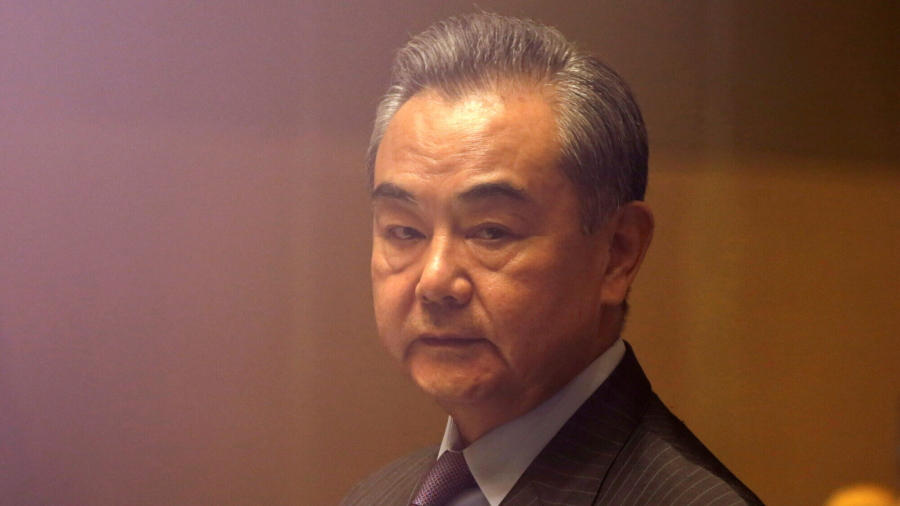Chinese foreign minister Wang Yi on Aug. 29 said Washington’s “attitude toward China” would decide how the two countries would work together on Afghanistan, during a phone call with U.S. Secretary of State Anthony Blinken.
Wang not only set the condition for bilateral cooperation, but also accused the United States of “fighting terrorism selectively,” according to a statement published by the Chinese foreign ministry.
While the Chinese ministry’s statement detailed Wang’s demands for the United States, State Department spokesperson Ned Price issued a brief statement on the call.
Blinken and Wang spoke about “the importance of the international community holding the Taliban accountable for the public commitments they have made regarding the safe passage and freedom to travel for Afghans and foreign nationals.”
Price’s statement did not offer any other details about the call.
Wang said the U.S. attitude would be measured by its actions: Stop “smearing and attacking” Beijing and stop “undermining” China’s sovereignty. Additionally, Wang said that the United States “should take seriously” China’s “two lists” and “three bottom lines.” Doing what China said would bring bilateral ties “back on track” to meet Beijing’s wishes, Wang added.
It’s unclear what smearing and attacks Wang was referring to. In July, the Chinese regime also accused Western journalists of “smearing China” after they published reports critical of Chinese policies on local floods. The accusation, promoted through China’s state-run media, resulted in Chinese citizens harassing and threatening Western reporters covering the disaster on the ground.
Meanwhile, Chinese state-controlled media have been publishing their own negative reports about the United States, such as labeling America as an unreliable partner given its chaotic withdrawal from Afghanistan.
Beijing handed the lists and three demands to the U.S. Deputy Secretary of State Wendy Sherman, when she traveled to China in late July to meet with Wang and his deputy Xie Feng. One of the lists asked the United States to correct its “wrongdoings,” including revoking U.S. sanctions on Chinese Communist Party (CCP) officials.

One of the demands requires that the United States not “interfere” in the Chinese Communist Party’s management of issues in the troubled regions of Xinjiang, Tibet, and Hong Kong. Many Western governments, including the United States, have called out China for its human rights violations in the three regions, particularly over the detention of over a million Uyghurs in Xinjiang.
The communist regime has turned Sherman’s China visit—as well as the March meeting in Alaska when Wang and China’s foreign policy official Yang Jiechi dressed down Blinken and national security adviser Jake Sullivan—into a propaganda coup.
It was the second talk between Blinken and Wang over Afghanistan this month. According to the State Department, Blinken and Wang talked about the “security situation” in Afghanistan during the earlier call on Aug. 16 after the fall of Kabul to the Taliban.
During that call, Wang said China was ready to “have communication and dialogue” with the United States on issues related to Afghanistan, but he criticized the swift U.S. withdrawal as having a “severely adverse impact” on the war-torn nation, according to China’s foreign ministry.
It remains to be seen how much China would actually benefit from a Taliban-controlled Afghanistan.
“I’m not sure that China is actually going to benefit because Beijing now has to do something that it’s never done before, which is to manage a very difficult security situation outside his borders,” said Gordon Chang, author of “The Coming Collapse of China,” during a recent EpochTV webinar.
Aside from Afghanistan, Wang also accused U.S. intelligence officials of “cooking up” their report on the origins of the CCP virus, during the latest call with Blinken, according to the Chinese statement. He also demanded that the United States stop “politicizing” tracing the origin of the virus.
The U.S. intelligence report, which was released on Aug. 27, stated that it couldn’t come to a conclusive assessment about the pandemic’s origins, given China’s refusal to cooperate.
The CCP virus originated in China’s central city of Wuhan. The report concluded the virus could have either come from an infected animal or a “laboratory-associated incident.”
China’s Wuhan Institute of Virology (WIV), home to one of China’s highest-level biosafety P4 laboratories, has been under scrutiny for being the source of the virus. U.S., Canadian, and French funding to the lab for controversial gain-of-function research has also come under scrutiny.
A State Department fact sheet released in January stated it had reason to believe that “several researchers inside the WIV became sick in autumn 2019, before the first identified case of the outbreak, with symptoms consistent with both COVID-19 and common seasonal illnesses.”
From The Epoch Times


